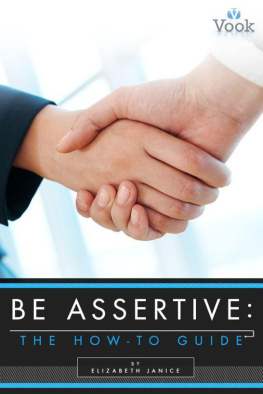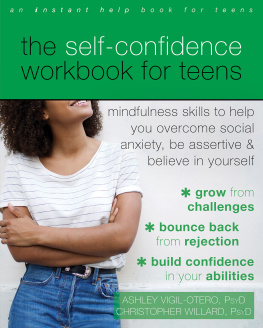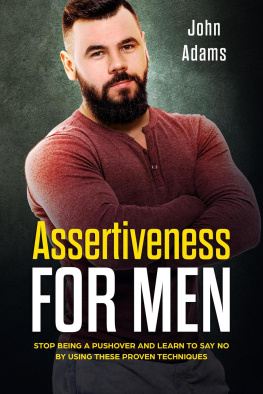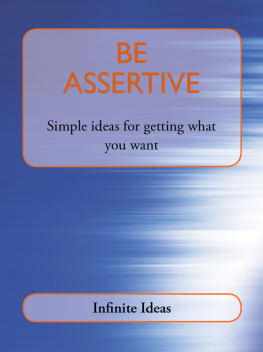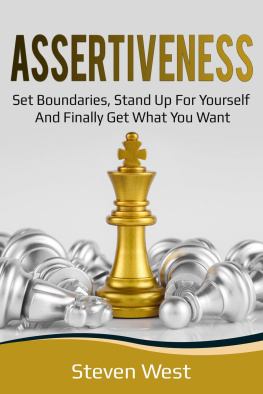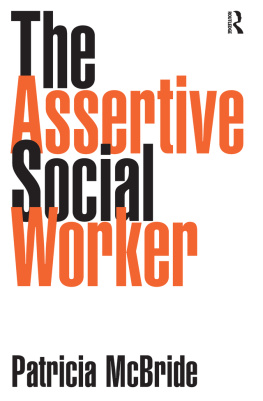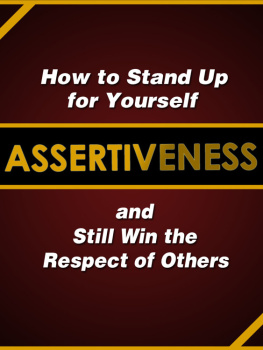Do you ever wonder why some people always seem to get what they want whether its a promotion or bigger paycheck, the best table in a restaurant or more cooperation from friends and family? Their secret: assertiveness.
A ssertiveness is a widely misunderstood concept. Many of us mistakenly equate assertiveness with being aggressive and overbearing. But assertiveness is actually the opposite. Assertive people are not afraid to speak their minds and ask for what they want, but are at the same time considerate of other peoples feelings. They are insistent, but also polite. They exude self-confidence, but they are never pushy or controlling.
If being assertive isnt easy for you, you are not alone. Many people, especially women, have a really hard time standing up for themselves in a calm, cool, effective manner. The reasons are myriad. Many of us were raised to believe that its not nice to put our own needs first. Others hesitate to speak up because we hate conflict or criticism, or dread the possibility of being embarrassed. Some of us go along with the crowd simply because we want to be liked. Whats more, many people harbor the misguided notion that we shouldnt have to ask that our friends, coworkers and family members should intuitively know what we want.
But you cant expect the other people in your life to be mind readers, and unless you dare to speak up, you risk going through life being unheard and feeling like a perpetual victim. Rather than being selfish, its actually a sign of strength if you can speak your mind clearly, and without apology, and ask for the things you want.
People who communicate in an assertive manner have greatly reduced levels of interpersonal conflict in their lives. Because their actions are based on mutual respect, they tend to have stronger, more supportive relationships. Indeed, assertiveness can have powerful positive effects on virtually every area of your life.
It can help you to:
- Boost your self-esteem.
- Earn other peoples respect.
- Improve your communications and decision-making skills.
- Create win-win situations.
- Have healthier, more honest relationships.
- Increase your career satisfaction and success.
- Ward off anger, stress and high blood pressure.
Assertiveness may not come naturally to you, but the good news is that it is a skill that can be learned. Everyone can benefit from learning how to become more assertivefrom the passive wallflower who wants to stop being a doormat, to the aggressive bully who wants to learn how to be more tactful and accommodating.
You cant change years of conditioning overnight, but with practice, you can get more of the things you want. Of course, theres no guarantee that you will always get everything you desire, but you will get more of the things you ask for, and have more positive interactions with others, simply by mastering the art of assertiveness.
IMPORTANT
Dont expect the other people in your life to be mind readers. Unless you speak up, others will be clueless about what you really want. Becoming assertive will benefit all areas of your life. Youll feel more confident and in control of your personal relationships, your career, even your health!
Chapter 2
What Exactly is Assertiveness?
I n a nutshell, assertiveness means looking out for your own rights while respecting the rights of others.
Communication styles fall into four distinct patterns:
- Passive.
- Aggressive.
- Passive-aggressive.
- Assertive.
Assertiveness is the middle ground between aggression and passivity.
We all use different styles with different people and in different situations. For instance, you might be passive with your boss and passive-aggressive with your mother-in-law. But in general, we tend to lean toward one particular style.
Passive Communication
If your main style is passive, youre a nice person who often gets taken advantage of by others. You hate conflict and have a hard time saying no, even to unreasonable requests. You go out of your way to avoid conflict and put your own needs last, so you routinely say things like, Its not a problem. You probably apologize a lot. You also tend to let little annoyances build up until you reach the breaking point, leaving the people around you feeling baffled because your anger seems to come out of nowhere.
You may think of yourself as a peacekeeper. But in reality, you are sending the message that your feelings and opinions are not as important as other peoples. This keeps you from having authentic relationships. Even worse, youre causing yourself to feel stressed, angry, resentful, and victimized.
REMEMBER
Passive communicators hold their feelings in until they are pushed too far. Other people often dont even realize there is a problem until the passive person finally explodes.
Aggressive Communicators
If your style is aggressive, you come across as a self-righteous bully who routinely dismisses other peoples feelings and opinions. You use criticism, blame, intimidation and/or humiliation to dominate others. In conversation, you frequently interrupt and use a lot of you statements, saying things like: You did this, or Its all your fault.
You may think that your actions help you get what you want, but youre paying a high price. Aggression undercuts trust and mutual respect, so you probably have little social support, although you may be clueless about the part youve played in alienating friends, family and coworkers. Deep inside, you probably feel misunderstood, powerless and even like a victim.
CAUTION
Aggressive communicators dont realize that their own behavior is driving people away. Ironically, they often end up feeling lonely and victimized, too.
Passive-Aggressive Communicators
As the name suggests, this is a two-sided style, an uneasy mixture of agreeableness and resistance. On the outside, you appear easygoing and cooperative. But on the inside, you resist authority. You say yes, when you really want to say no. You smile, even when you are quietly seething with anger. Uncomfortable with confrontation, you use indirect means to get your point acrossincluding sarcasm, muttering to yourself and spreading rumors.
The real problem is that you are afraid to tackle issues head-on, so you manipulate others in subtle ways. But since this doesnt work in the long run, you end up trapped in a vicious cycle of powerlessness.
Assertive Communicators
If you are assertive congratulations! You carry yourself in a confident manner and feel free to state your true feelings and beliefs without apologizing. At the same time, youre a good listener and allow others to express their opinions. Consequently, people look up to you. In conversation, you probably use the word I a lotbut in a good, not egotistical, way. You say things like, I feel or I would like. Although you are respectful of the people around you, youre no pushover. You know your own limits and refuse to be pushed beyond them.
Assertiveness is by far the healthiest communication style for all concerned, but its also the most underused. You always have a choice as to which style to use, so resolve to start being more assertive today. Youll be surprised at the changes in your life.
REMEMBER
Assertiveness is a sign of self-confidence, personal strength and respect for others.
Chapter 3
The Words You Choose
A ssertive people are persuasive conversationalists. Even in the most difficult encounters, they know how to get their point across without making the other side feel defensive. Here are four language techniques you can use to help defuse tension.

